In an industry that stands for justice and fairness, the latest technology provides lawyers and attorneys with the tools needed to uphold the rule of law, protect individual rights, and ensure access to justice for all. Still, these aren’t all the benefits legal technology promises. When adopted strategically and implemented right, it transforms the ways the companies in the legal industry operate daily. In this article, we will discover how legal tech solutions improve legal services delivery – from the perspective of law firm owners and their respective customers.
Legal Tech vs Law Tech – What’s the Difference?
The concepts of legal and law tech are often used interchangeably, but they are not the same things. Let’s start with clearing out the definitions.
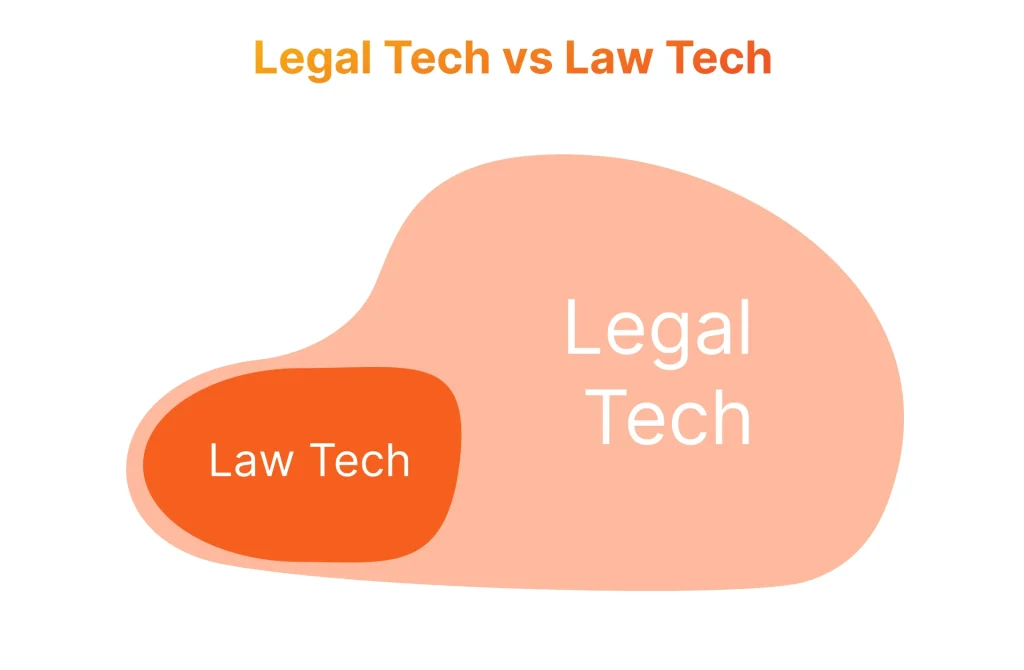
Legal tech generally refers to technology solutions and innovations designed to improve and streamline various processes within the legal industry. This includes tools, software, platforms, and services tailored specifically for legal professionals, law firms, and legal departments. It encompasses a wide range of applications, including case management software, contract automation tools, e-discovery platforms, legal research databases, and regulatory compliance solutions.
Law tech tends to have a broader scope and may include technology solutions that impact the practice of law as well as the delivery of legal services. It encompasses not only tools and platforms used by legal professionals but also innovations that influence how legal services are accessed, consumed, and delivered by clients and consumers.

Artem Dyranov
Business Analyst & QA Engineer at SPD Technology
“While legal tech and law tech are closely related and often mixed up, legal tech may have a broader scope and audience, encompassing various aspects of the legal industry. In contrast, law tech may have a narrower focus on technology solutions directly applicable to legal practice and case management.”
6 Law Firm Routine Tasks Legal Technology Streamlines
When modern technology solutions are skillfully implemented, routine tasks of legal professionals require less time and effort. Here is a quick recap of common tasks that can be improved with modern legal technology solutions.
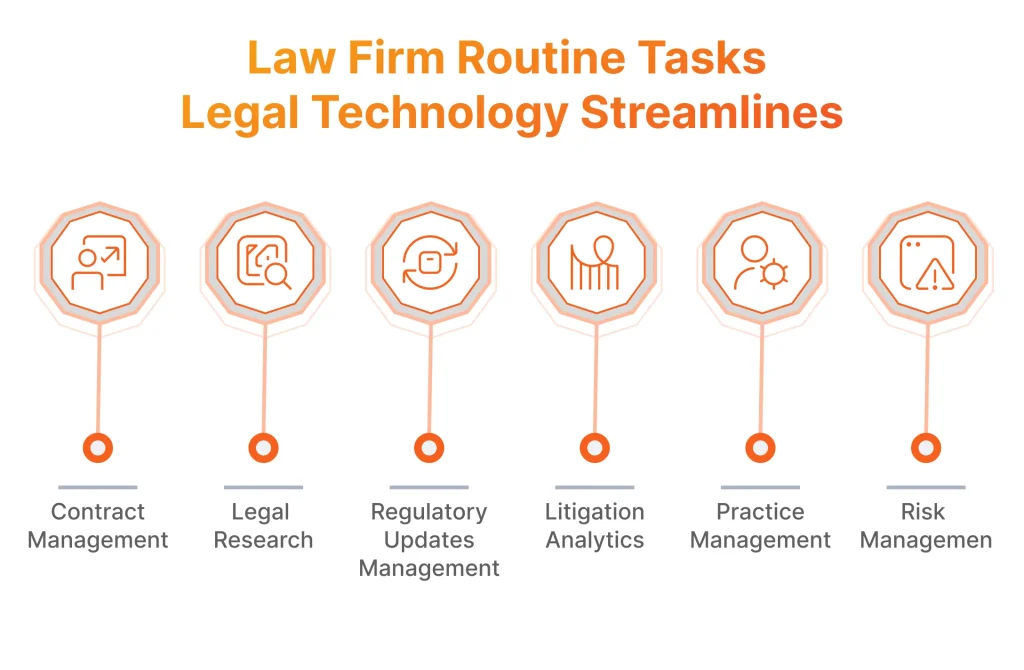
Contract Management
With the help of contract management software, all contracts can be centralized in a digital repository, eliminating the need for manual storage and retrieval of paper documents. This was just the goal of one of our customers, which we achieved within this project by completely overhauling and expanding a legacy DMS, creating a data storage space for new users, and unlocking business growth opportunities.
The following functions can be automated or sped up with a contract management solution:
- Contract creation and review
- Approval of workflows
- Drafting and negotiating contracts.
Additionally, it is possible to introduce features like version control, electronic signatures, and deadline reminders, ensuring that contracts are managed efficiently and compliantly throughout their lifecycle.
We know how to create a Document Management System (DMS) that will allow you to take the leading market positions — feel free to discover the details right now!
Legal Research
Legal technology can streamline legal research by providing access to comprehensive databases of case law, statutes, regulations, and legal commentary, all within a single online platform. AI-powered legal research tools use Natural Language Processing (NLP) algorithms to analyze and summarize relevant legal documents, saving time and effort for legal professionals. Summarization algorithms can also extract key points, arguments, and decisions, providing concise summaries that enable users to quickly grasp the main ideas without having to read through entire documents.
Regulatory Updates Management
It is possible to improve regulatory updates management by monitoring changes in laws, regulations, and compliance requirements across various jurisdictions and industries. Regulatory compliance platforms provide real-time alerts and notifications about relevant updates, enabling organizations to stay informed and proactively address compliance obligations.
Litigation Analytics
Legal technology streamlines litigation analytics by analyzing vast amounts of case data, court decisions, and litigation trends to identify patterns, insights, and strategic opportunities. Litigation analytics platforms use data visualization tools to present information in visually intuitive formats, such as charts, graphs, and heat maps, enabling users to identify trends and correlations at a glance.
Practice Management
Legal technology’s important impact can be felt in practice management as well, due to integrating and automating various administrative and operational tasks, such as timekeeping, billing, client intake, and matter management. Practice management software provides centralized dashboards and workflows for managing clients, matters, documents, and financials, improving organization and efficiency within law firms.
Risk Management
Legal technology also boosts risk management by providing tools and solutions to identify, assess, and mitigate legal and compliance risks across an organization. Risk management platforms enable organizations to conduct risk assessments, monitor risk indicators, and develop risk mitigation strategies in real time.
The Main Benefits of Legal Technology
In addition to streamlining the above mentioned tasks, organizations can experience several major benefits if legal tech solution is implemented correctly, including:
- Operation optimization
- Delivering better client outcomes
- Gaining higher positions in the market.
Let’s discuss the most significant benefits of technology in the legal world more closely.
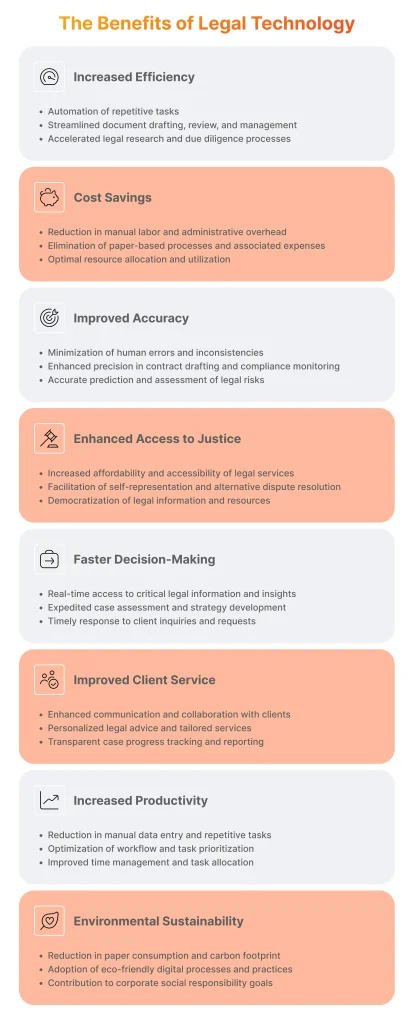
Increased Efficiency
Significant efficiency increase is probably one of the most important reasons to implement the latest technology and get rid of some time- and laborconsuming manual processes.
Automation of repetitive tasks
Law technology automates routine and repetitive tasks, such as document generation, data entry, and scheduling, freeing up valuable time for legal professionals to focus on higher-value work. For this goal, law firms frequently choose custom document management system development, creating an efficient solution accurately tailored to their business goals, as a result.
Streamlined document drafting, document review, and management
Legal technology solutions streamline the entire document lifecycle, from drafting and editing to review and storage, reducing the time and effort required for document-related tasks. Companies can achieve those benefits by leveraging document automation software, electronic document management systems, and collaboration platforms. These tools will unlock more accuracy in document drafting, review, and management.
Accelerated legal research and due diligence processes
AI-powered legal research tools and analytics platforms enable lawyers to conduct comprehensive research and due diligence more quickly and effectively, resulting in faster decision-making and case preparation. These tools leverage machine learning algorithms to expedite the process of analyzing and extracting insights from large volumes of legal data. These AI tools can also assist in identifying relevant case law and drafting legal memoranda.
Cost Savings
Cost cutting is another very significant benefit that is especially important for the larger companies with a large amount of staff.
Reduction in manual labor and administrative overhead
Manual labor and administrative tasks often consume significant resources in terms of time, labor, and infrastructure. By automating manual tasks and streamlining workflows, legal technology helps reduce the need for manual labor and administrative support, leading to significant cost savings for different types of legal firms and departments. One of the ways to achieve this is to utilize legal practice management software that integrates case management, time tracking, billing, and document management functionalities.
Elimination of paper-based processes and associated expenses
Document management system benefits include digitizing and centralizing document management, eliminating the need for paper-based processes, physical storage, and associated expenses such as printing, copying, and shipping.
In one of our projects, we successfully implemented advanced document search functionality, catering to the complexities of efficient information retrieval. Our developed solution brought about a noteworthy reduction in costs for the client’s customer base. This enhancement in cost-effectiveness has made their services considerably more accessible, fostering a broader clientele.
Optimal resource allocation and utilization
Effective resource allocation ensures that available resources, including time, talent, and finances, are utilized in the most efficient way. Legal software enables firms to optimize resource distribution, ensuring that personnel, time, and budget are designated to tasks and projects where they can deliver the greatest value. Practice management software, in particular, is an effective tool for this as well.
Improved Accuracy
The opportunity to make more accurate decisions is another significant benefit of legal technology we should discuss.
Minimization of human errors and inconsistencies
Legal matters often involve high stakes, and errors or inconsistencies in legal documents, contracts, or case strategies can have significant consequences for clients and firms. Legal technology reduces the risk of human lawyers’ errors in legal processes, such as contract drafting, compliance monitoring, and data entry, leading to more accurate outcomes and reduced legal exposure. Document automation software can significantly reduce the amount of human errors.
Enhanced precision in contract drafting and compliance monitoring
Contracts form the basis of legal agreements between parties, and inaccuracies or ambiguities in contract language can lead to disputes, litigation, or financial losses. AI-powered contract analysis and drafting tools, as well as compliance management platforms, help ensure that contracts and legal documents are drafted accurately and compliant with relevant laws and regulations. Legal research tools can also help to achieve this.
Accurate prediction and assessment of legal risks
Identifying and assessing legal risks allows businesses to take proactive measures to mitigate potential negative consequences. Predictive analytics and risk assessment tools provide legal professionals with data-driven insights into potential legal risks and outcomes, enabling them to make more informed decisions and strategies. So, tapping into technology here can be a significant factor in the success of your business and its reputation.
Enhanced Access to Justice
Unfortunately, not all individuals and organizations have equal access to justice. Modern legal technology is called to improve the situation.
Increased affordability and accessibility of legal services
The reasonable affordability of legal services ensure that individuals and businesses have access to legal assistance when needed, regardless of their financial resources. This promotes fairness and equity in the legal system. Technology makes legal services more affordable and accessible to a broader range of individuals and organizations, particularly through online platforms, self-help tools, and alternative fee arrangements.
Facilitation of self-representation and alternative dispute resolution
Online Dispute Resolution (ODR) platforms and self-help resources empower individuals to navigate legal processes and resolve disputes without the need for hiring legal professionals, reducing barriers to access to justice.
The main types of ODR platforms include:
- Mediation platforms that facilitate negotiation and settlement discussions between parties in dispute with the assistance of a trained mediator.
- Arbitration platforms, for enabling parties to resolve disputes through binding or non-binding arbitration conducted by a neutral third-party arbitrator.
- Negotiation platforms that facilitate direct communication and negotiation between parties in dispute, allowing them to reach a mutually acceptable resolution without the need for formal mediation or arbitration.
- Ombudsman platforms, for providing a confidential and impartial forum for parties to raise complaints, grievances, or concerns and seek informal resolution with the assistance of an ombudsman or mediator.
- Hybrid ODR platforms, for combining elements of mediation, arbitration, negotiation, and ombudsman services to offer flexible and customized dispute resolution solutions tailored to the specific needs of parties and cases.
Democratization of legal information and resources
Democratizing legal information promotes transparency and accountability in the legal system. When legal rules, procedures, and precedents are readily accessible to the public, it fosters trust in the legal system and enables individuals to hold legal authorities and institutions accountable for their actions. Legal solutions democratize access to legal information and resources, providing individuals and organizations with the legal knowledge and tools they need to understand their rights, obligations, and options under the law.
Faster Decision-Making
In critical cases, the speed of decision-making becomes crucial when it comes to fair judgment and strategic decisions.
Real-time access to critical legal information and insights
Real-time access to legal insights enables law firms and legal departments to develop strategic plans and anticipate potential legal issues or opportunities. By monitoring legal developments as they occur, firms can proactively adjust their strategies, mitigate risks, and capitalize on emerging trends. Technology provides legal professionals with real-time access to critical information, case updates, and insights, enabling them to make faster and more informed decisions.
Expedited case assessment and strategy development
Legal matters often have deadlines and time constraints associated with them. These include statutes of limitations and court filing deadlines. AI-powered analytics and case management software help lawyers assess cases, identify relevant precedents, and develop winning strategies more quickly and effectively, improving overall case management and outcomes.
Timely response to client inquiries and requests
Clients expect prompt and responsive communication from their legal representatives. Timely responses demonstrate professionalism, attentiveness, and a commitment to client service, enhancing client satisfaction and trust. Legal technology enables lawyers to respond to client inquiries, requests, and emergencies more quickly and efficiently, enhancing client satisfaction and trust.
Improved Client Service
Speaking of client satisfaction, there is always room for improvement for professionals and companies, so the technology is here to help.
Enhanced communication and collaboration with clients
Effective communication and collaboration build trust and confidence between lawyers and clients. By keeping clients informed and involved in the legal process, lawyers prioritize clients’ needs and concerns. It is possible to facilitate seamless communication and collaboration between lawyers and clients through online portals, messaging platforms, and virtual meeting tools, improving client engagement and satisfaction.
Personalized legal advice and tailored services
Every case is unique, with its own set of facts, circumstances, and complexities. Personalized legal advice takes into account the specific needs, goals, and concerns of individual clients. AI-powered analytics and client management tools enable lawyers and law firms to deliver personalized legal advice and tailored services based on clients’ individual needs, preferences, and objectives, helping to deal with the most complex situations.
Transparent case progress tracking and reporting
Transparent case progress tracking and reporting instill confidence in clients by keeping them informed about the status of their legal matters. Clients can benefit from transparency into the progress of their cases, including status updates, milestones, and billing information, enhancing trust and accountability in the client-lawyer relationship. The modern software can provide customized reporting with timely updates on important details.
Increased Productivity
Making the best out of your existing human resources can result in an instant advantage.
Reduction in manual data entry and repetitive tasks
Legal professionals often spend a significant amount of time on manual data entry and repetitive tasks, such as filling out forms, organizing documents, and inputting information into databases. Automating these tasks saves time and allows lawyers to focus on higher-value activities, such as legal analysis, strategy development, and client interaction. Legal technology tools can automate tasks like timekeeping, billing, and administrative work.
Optimization of workflow and task prioritization
Burnout and stress are common challenges in the legal profession, often resulting from excessive workloads and inefficient workflow processes. Law technology today optimizes workflow and task prioritization, ensuring that lawyers and staff allocate their time and resources effectively to meet deadlines, deliverables, and client expectations. Task management tools allow legal professionals to assign tasks reasonably, set realistic deadlines, and monitor progress.
Improved time management and task allocation
Clients expect their legal representatives to provide quick and efficient service. Effective time management allows lawyers to prioritize client matters appropriately, respond to inquiries promptly, and deliver work products within agreed-upon timelines. Time-tracking and project management tools help legal professionals manage their time more effectively, track billable hours, and allocate resources efficiently, resulting in increased productivity and profitability.
Environmental Sustainability
Last but not least is the care for the environment, and some major improvements can be achieved here as well.
Reduction in paper consumption and carbon footprint
Paper production contributes to deforestation, habitat loss, and greenhouse gas emissions, leading to environmental degradation and climate change. Legal technology reduces reliance on paper-based processes and documentation, leading to a significant decrease in paper consumption, printing, and waste generation. So, the impact and carbon footprint of legal operations can be significantly reduced.
Adoption of eco-friendly digital processes and practices
Among other significant benefits of legal technology is the fact that it promotes the adoption of eco-friendly digital processes and practices. For example, the wider adoption of electronic signatures, document management software, and virtual collaboration contribute to sustainability efforts. These practices set a great example for other industries.
Contribution to corporate social responsibility goals
By embracing legal technology and promoting environmental sustainability, law firms and legal departments can demonstrate their commitment to corporate social responsibility, environmental stewardship, and ethical business practices. For instance, implementing virtual courtrooms and hearings reduces the environmental impact of legal proceedings by eliminating the need for participants to get to the courtroom, or at least lowering the amount of travel, when it is possible.
Top 6 Innovative Legal Technology Use Cases for 2024
With new interesting legal tech cases emerging regularly, we would like to take a moment and highlight the most impressive projects that are already on the market, explaining their practical use cases.
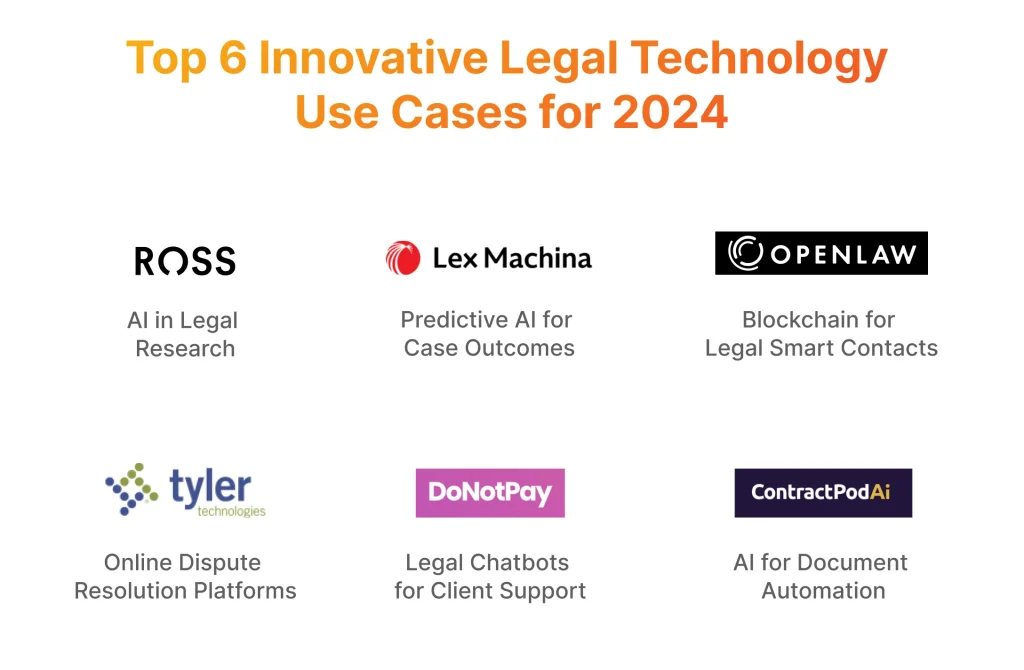
Artificial Intelligence in Legal Research and Due Diligence
In due diligence processes, AI can be useful by streamlining the review of contracts, agreements, and other documents by identifying potential risks, inconsistencies, or anomalies more efficiently than manual review.
ROSS Intelligence
A great example of this is ROSS Intelligence. It is an AI-powered legal research platform that helps lawyers conduct comprehensive legal research and find relevant case law and statutes efficiently. This platform offers legal software for fast and in-depth research, with features including:
- Question-based search: allowing experts to ask legal questions in language they would use with a colleague.
- Finding a similar language feature: highlighting text to find other cases with similar language to strengthen the position of the legal expert.
- Document Analyzer: checking overturned and questioned treatments on any legal documents.
- Question-focused case overviews: automatically summarize a case in the context of a query.
- Case treatments: quickly spotting cases that have been overturned or criticized.
Predictive Analytics for Case Outcomes
Predicting customer behavior with Artificial intelligence has long become possible in eCommerce. Still, the predictive capabilities of AI aren’t limited to this industry. For case outcomes analysis-based prediction, legal tech solutions of this type leverage historical case data, court decisions, and other relevant factors to forecast the likely outcomes of legal cases.

Artem Dyranov
Business Analyst & QA Engineer at SPD Technology
“By analyzing patterns and trends in past cases, predictive analytics algorithms can help lawyers assess the strengths and weaknesses of their arguments, develop winning strategies, and manage client expectations more effectively.”
Lex Machina
An interesting solution to pay attention to in this category is Lex Machina, a legal analytics platform, that uses Data Mining and Machine Learning to predict case outcomes, assess judge behavior, and identify litigation trends, empowering lawyers to make informed decisions. Advanced features of this product include:
- Analyzing courts and judges: the product allows the user to easily view and compare damages awarded by a specific judge in a specific practice area over a specific period.
- Evaluating opposing counsel: the user can quickly uncover crucial insights on the litigation experience of the opposing counsel (law firm or attorney) and start formulating potential strategies.
- Evaluating parties in the user’s matter: within minutes, the user can analyze a party’s experience before specific judges and courts, ascertain the likely timing of key events in a certain jurisdiction, and view damages awarded in similar cases.
- AI Text Summarization: the generated summaries surface the nature of the case, plaintiff and defendant information, alleged harm, and requested remedies to save users hours of research time, identify client impacts, and increase business development opportunities.
- The Case List Analyzer: the tool provides users with charts and graphs on every case list page to help them uncover strategic information and visualize trends without having to drill down into every case.
Blockchain for Smart Contracts and Legal Documentation
Blockchain technology offers a secure and transparent way to create, execute, and enforce smart contracts — self-executing agreements with terms written in code. Blockchain-based platforms provide a decentralized and immutable ledger for recording and verifying transactions, ensuring the integrity and authenticity of legal documents and agreements.
Open Law
A great example of this is OpenLaw, a blockchain-based platform for creating and executing smart contracts, enabling secure and automated transactions while ensuring transparency and immutability of legal agreements. The platform makes it easy to create legal agreements that work with Ethereum and have a simple setup and integration with day-to-day tools from Google and Microsoft. The core features include:
- Wrapping smart contracts in legal agreements in minutes.
- Signing and seamlessly interacting with smart contracts.
- Creating, accessing, and executing wrapped smart contracts from an easy-to-use API.
Online Dispute Resolution (ODR) Platforms
ODR platforms leverage technology to facilitate the resolution of legal disputes through online channels, such as web-based platforms or mobile applications. These platforms provide parties with access to mediation, arbitration, negotiation, and other Alternative Dispute Resolution (ADR) mechanisms, often more cost-effectively and conveniently than traditional courtroom proceedings.
Modria
For instance, Modria, an ODR platform used by eBay and PayPal, facilitates the resolution of consumer disputes through online mediation and arbitration, reducing the need for costly and time-consuming litigation. Prime features of the product are as follows:
- Built-in, persistent chat is available for the life of the dispute.
- Document and email templates are easily customizable
- Pre-built resolution flows make for an effortless court setup.
- Support for mediation and evaluation allows neutral parties to facilitate or decide an issue.
- Out-of-the-box resolution flows for the most common and time-consuming disputes — debt, landlord/tenant, small claims, divorce, custody, etc.
- Real-time dashboards, pre-configured reports, and data export options to help users stay on top of a caseload.
Legal Chatbots for Client Support and Intake
Legal chatbots use Artificial Intelligence and Natural Language Processing technologies to interact with clients, answer common legal questions, and assist with intake processes. Chatbots can provide instant responses to client inquiries, schedule appointments, collect relevant information, and route inquiries to the appropriate legal professionals, serving as a great example of artificial intelligence in customer service.
DoNotPay
A powerful solution in this category is DoNotPay. This is a legal chatbot which assists users with various legal issues, including parking tickets, landlord disputes, and asylum applications, through an intuitive chat interface. As stated by the developers, the product allows users a wide range of implementations that include:
- Fighting corporations
- Beating bureaucracy
- Finding hidden money
- Cancel subscriptions
- Automatically canceling free trials.
AI-Powered Document Automation and Contract Management
These tools enable lawyers to create, review, and manage legal documents more efficiently. Document automation and contract management tools use Machine Learning algorithms to analyze existing templates, clauses, and contracts, automatically generating customized documents based on user input and preferences.
ContractPodAi
An interesting solution of this type, ContractPodAi, is an AI-powered contract management platform that automates contract drafting, review, and management processes, improving efficiency and compliance for legal teams. The platform offers:
- Generative AI-powered legal assistant
- AI-driven Contract Lifecycle Management
- Task automation and productivity boost for enterprises.
Legal Technology Future Trends
According to Future Market Insights, the market valuation of the Legal Tech sector is most likely to hit US$ 29.60 billion in 2024, with forecasts indicating a potential exceedance of US$ 68.04 billion by 2034. This impressive market growth will be combined with several prominent trends that are expected to drive the legal tech industry in the coming years.
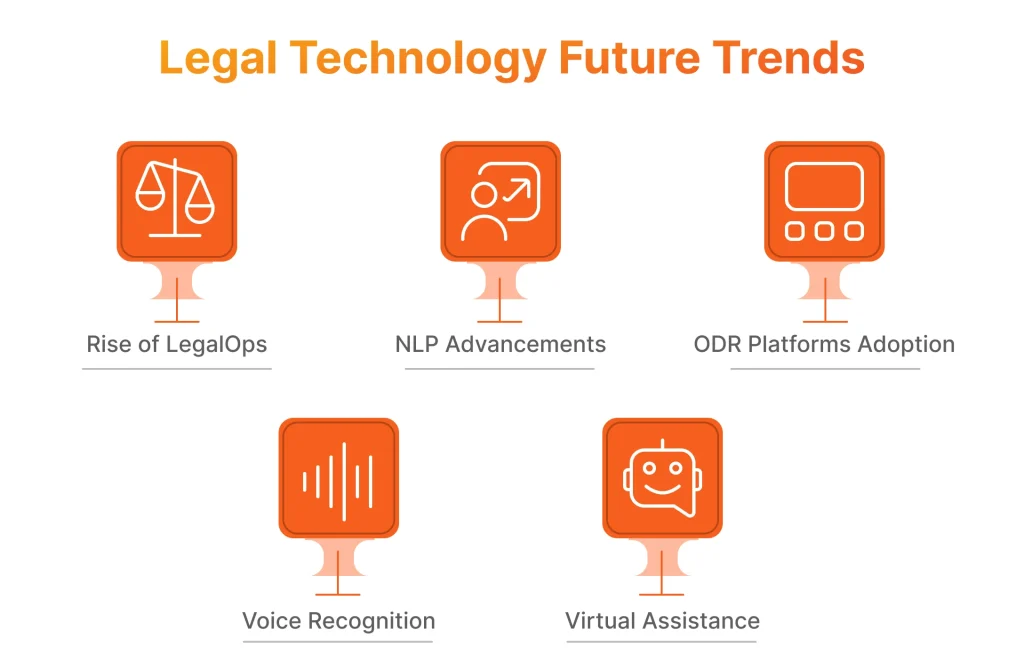
Rise of LegalOps
Legal Operations, or LegalOps, refers to the function within a legal department or law firm that focuses on optimizing and improving the efficiency and effectiveness of legal processes and workflows. The most interesting solutions to follow include:
- Matter Management Systems: centralized platforms for organizing, tracking, and managing legal matters and cases. These systems typically offer features such as matter intake, task assignment, document management, deadline tracking, and reporting.
- Contract Lifecycle Management (CLM) Software: automates and streamlines the contract lifecycle, from contract creation and negotiation to execution and renewal. These solutions typically include features such as contract drafting templates, electronic signature integration, version control, approval workflows, and contract analytics.
- Legal Spend Management Tools: help legal departments track and manage their legal expenses more effectively. These tools enable users to monitor outside counsel fees, budgets, invoices, and expenses, and analyze spending trends over time.
Natural Language Processing Advancements
Natural Language Processing (NLP) is a branch of Artificial Intelligence (AI) that focuses on the interaction between computers and human language. In the legal industry, NLP technology is being increasingly used to automate and enhance various tasks, such as contract analysis, legal research, e-discovery, and due diligence.
The global Natural Language Processing market is projected to reach US$ 29.19 billion in 2024 if Statista is to be believed. The market size is expected to show an annual growth rate (CAGR 2024-2030) of 13.79%, resulting in a market volume of US$ 63.37 billion by 2030. According to Market.us, the business and legal services sector holds the largest share of the NLP adoption rate at 26.5%, which is expected to grow in the near future.
Expansion of Online Dispute Resolution Platforms
With more advancements in Artificial Intelligence and Machine Learning, as well as other technologies like internet connectivity, cloud computing, and mobile devices, ODRs will become even more powerful and will have a very bright future in the legal tech sector.

Artem Dyranov
Business Analyst & QA Engineer at SPD Technology
“Additionally, there is a growing recognition of the limitations and inefficiencies of traditional litigation, such as high costs, lengthy proceedings, and limited accessibility. As a result, there is a rising demand for alternative dispute resolution methods, such as mediation, arbitration, and negotiation, which offer faster, more cost-effective, and collaborative approaches to resolving conflicts.”
Voice Recognition and Virtual Assistants
Voice recognition technology and virtual assistants are becoming increasingly integrated into complex legal workflows to enhance productivity and convenience. Legal professionals can use voice recognition software to dictate notes, draft documents, or perform searches hands-free, saving time and reducing the need for manual typing.
Virtual assistants powered by AI technology can assist with tasks such as scheduling appointments, managing emails, conducting legal research, and providing case updates. GlobeNewswire believes that the Voice and Speech Recognition Market will be worth US$ 26.8 billion by 2025 at a CAGR of 17.2% from 2019, while the Virtual Assistant Market is expected to reach US$ 33.4 by 2030.
How to Start Adopting Legal Technology This Year?
The adoption of legal technology can bring you significant, sometimes even game-changing benefits, as already existing use cases prove. By following the next steps, your company can adopt legal technology effectively, driving improvements in efficiency, productivity, and client service while staying competitive in the rapidly evolving legal landscape.
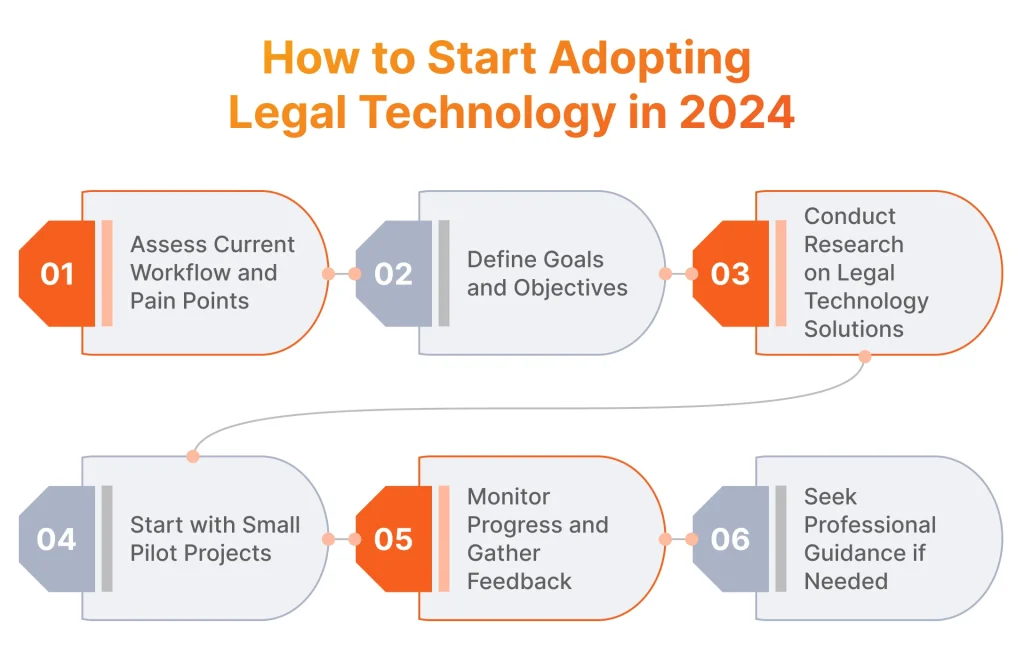
Assess Current Workflow and Pain Points
It will be a good idea to start by conducting a thorough assessment of your firm’s current workflows, processes, and technology usage to identify inefficiency, bottlenecks, and manual processes within its operations. This assessment should include gathering feedback from staff members, attorneys, and clients to gain deeper insight into understanding pain points and areas for improvement. Utilize surveys, interviews, and observations to gain insights into how technology could streamline operations and enhance productivity.
Define Goals and Objectives
After completing rigorous research, determine specific objectives for adopting legal technology in your organization, such as improving efficiency, reducing costs, enhancing client service, or staying competitive.
The key actions you should take include:
- Prioritizing goals based on their importance and feasibility within the firm’s budget and resources.
- Setting measurable goals and Key Performance Indicators (KPIs).
- Tracking the success of technology adoption efforts over time.
Conduct Research on Legal Technology Solutions
Explore available legal technology solutions that align with the determined goals and objectives. Research software vendors, platforms, and tools that offer features relevant to the firm’s legal practice areas and workflow need to consider factors such as user-friendliness, scalability, integration capabilities, security, and customer support when evaluating potential solutions.
Start with Small Pilot Projects
Select one or two legal technology solutions to adopt within some of the departments or teams in your organization, while focusing on solutions that address immediate pain points or offer quick wins to demonstrate the value of technology adoption. Designate a pilot group of staff members or attorneys to test the selected tools.
Monitor Progress and Gather Feedback
Measure the impact of the pilot project on your organization’s operations, efficiency, and client satisfaction. Gather feedback from staff members and attorneys on their experiences with the new technology, its usability, and its effectiveness to consider in your future integrations, and make the necessary adjustments to maximize the benefits of legal tech solutions adoption.
Seek Professional Guidance if Needed
Leverage external resources and industry best practices to overcome challenges and optimize the use of technology within the organization, and find time to attend workshops, webinars, and conferences to stay informed about the latest trends and developments in legal technology and learn from peers and industry experts.
If you need additional help in providing guidance and support throughout the adoption process or creating a legal tech solution from scratch, we, at SPD Technology, are ready to help you. We have experience in various integrations, including helping a legal tech company with a 20 million customer base to improve payment systems integration.
In one of our other projects, we transformed a legacy notary service into a full-blown legal tech solution, not only integrating with 13+ third-party services but also delivering an admin panel with different user roles from scratch, developing storage functionality, and successfully dealing with legacy code.
Conclusion
The legal field is continuing its growth, and we will see more advanced tools arise that will help law firms navigate complex regulatory landscapes better. Law firms and legal professionals will only benefit from the technological advancements, experiencing advantages like increased efficiency, enhanced client service, cost savings as well as improved decision-making.
We are ready to become your technology provider and deliver future-proof, innovative solutions to elevate your business and make the effort of your employees more productive!
FAQ
- What is Legal Tech?
Legal tech, short for legal technology, refers to the use of technology to streamline and enhance various processes within the legal industry. This broad meaning of what is legal tech can encompass a wide range of tools and solutions, including but not limited to software, applications, platforms, and services tailored specifically for legal professionals and law firms.
- What are the main benefits of Legal Tech?
The benefits of legal technology include but are not limited to:
- Increased efficiency
- Cost savings
- Improved accuracy
- Enhanced access to justice
- Faster decision-making
- Improved client service
- Increased productivity
- Environmental sustainability.
- How to grow your law firm with technology?
To grow your law firm with technology, consider the following strategies:
- Identify your law firm’s specific needs and pain points, and then research and invest in legal tech solutions that address those needs effectively. This could include case management software, document automation tools, e-discovery platforms, and client relationship management systems.
- Ensure that your legal team is properly trained to use the new technology effectively. Offer ongoing support and resources to help them navigate any challenges or questions during the adoption process.
- Encourage a mindset of continuous improvement and innovation within your law firm. Solicit feedback from your team on how technology can be leveraged to improve processes and workflows, as well as empower them to experiment with new tools and approaches.
- Identify repetitive tasks and processes within your firm that can be automated using technology, such as document assembly, billing, and time tracking.
- Utilize analytics and legal data visualization tools to gain actionable insights into your firm’s performance, client preferences, and market trends.



